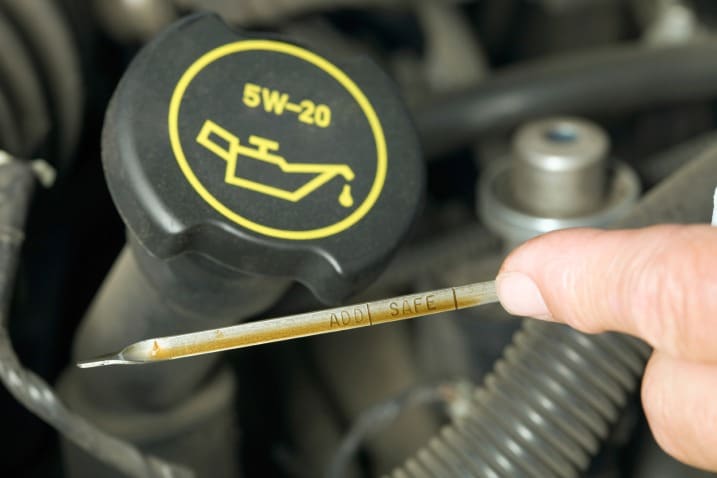Click here for more current information on oil changes.
Some of you may not know this, but oil is the lifeblood on which all internal combustion engines must operate. It's more crucial than any other engine fluid, including gas and water, because it has the potential to cause the most damage in the shortest time if it's quality or quantity is compromised. If you remember those Castrol GTX commercials from a few years back you already have a sense of what can happen when engine oil is neglected.
But enough horror stories. If you simply change your oil and filter every 3000 to 5000 miles (or every 3 months, whichever comes first) and check its level regularly, chances are you'll never experience an oil-related problem. For drivers using synthetic oil, intervals as long as 5,000 miles or six months between changes are considered acceptable. Some service centers (usually the ones that will benefit economically) will tell you that extreme driving conditions like stop-and-go traffic or extremely cold weather require more frequent changes. The truth is that every three months or 3,000 miles is pretty extreme. If you aren't driving in stop-and-go traffic, through minus 20-degree blizzards, or up mountain passes with a 5,000 pound trailer, you could probably go longer between changes and there's certainly almost no condition that would warrant even more frequent changes.
O.K., so your oil has been in there for longer than 3,000 miles (maybe a lot longer...) and it's time to do something about it. At this point you basically have two options. You can change it yourself or you can go somewhere to have it changed for you. Which option is better? You may not like this but the correct answer is "That depends."
If your vehicle is an older or vintage model that is easy to work on and if you live in a small town or rural community, changing your own oil is a viable option. It will cost you less than if you paid someone to do it (around ten dollars) and if you have a decent set of tools and/or access to a vehicle lift, the whole process shouldn't take more than 15 minutes. The concept of parking your vehicle in the driveway while oil runs out of it probably won't offend your neighbors or landlord, either. Of course, just living out in the middle of West Texas doesn't excuse you from properly disposing of the oil which, even in West Texas, means you can't go dumping it into the ground. To find out about your local area recycling programs check the phone book or ask around at automotive service centers.
What about the car owner who lives in a downtown New York or Los Angeles apartment, drives a 1997 BMW 7-series, and has never seen the underside of an automobile (except during those rollover crashes on "Wildest Police Videos")? Well, first of all, if you own a late-model Bimmer you should have all maintenance duties covered for four years or 50,000 miles as part of the purchase price. This type of extended service contract is standard on many new cars, which means all these owners have to do is bring the vehicle in for service as scheduled. Obviously you'll want to confirm whether or not you have this type of agreement before running off to the nearest Jiffy Lube.
If you don't have a service agreement that includes oil changes but still would rather leave the job to someone else, there are two service centers that specialize in keeping your oil squeaky-clean. Both Jiffy Lube (jiffylube.com) and Grease Monkey (greasemonkey.net) are national chains that not only change your oil and oil filter but also check and fill your other vital fluids, lubricate the chassis, perform an overall vehicle inspection, vacuum the interior, and even clean the windows. Grease Monkey does all this for $26.99 while Jiffy Lube charges $28.99. I don't know about the rest of you, but not having to wash my own windows is almost worth 30 bucks by itself.
Since it would cost at least 8 to ten dollars for just the oil and filter, plus whatever it costs to top off the washer reservoir, brake fluid, power steering fluid...well, you get the picture. Remember that any automotive service center is capable of changing your oil, but you'll be hard pressed to find one as cheap as either Jiffy Lube or Grease Monkey. And, since this type of work is all these companies do, they've pretty much got it down to a science and can usually perform the entire service in less than 20 minutes (Grease Monkey claims "All In About 10 Minutes.")
So there you have it. Spend ten minutes and 30 dollars every three months or 3,000 miles, and the most vital of vital fluids, plus all the other ones too, is handled. Take it from someone who knows, it's easier and cheaper than replacing a set of rings and bearings.
